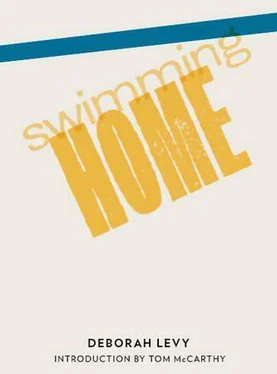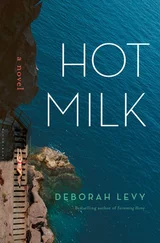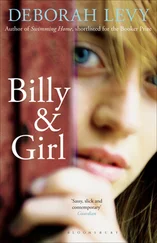Deborah Levy - Swimming Home
Здесь есть возможность читать онлайн «Deborah Levy - Swimming Home» весь текст электронной книги совершенно бесплатно (целиком полную версию без сокращений). В некоторых случаях можно слушать аудио, скачать через торрент в формате fb2 и присутствует краткое содержание. Год выпуска: 2011, Издательство: And Other Stories, Жанр: Современная проза, на английском языке. Описание произведения, (предисловие) а так же отзывы посетителей доступны на портале библиотеки ЛибКат.
- Название:Swimming Home
- Автор:
- Издательство:And Other Stories
- Жанр:
- Год:2011
- ISBN:нет данных
- Рейтинг книги:4 / 5. Голосов: 1
-
Избранное:Добавить в избранное
- Отзывы:
-
Ваша оценка:
- 80
- 1
- 2
- 3
- 4
- 5
Swimming Home: краткое содержание, описание и аннотация
Предлагаем к чтению аннотацию, описание, краткое содержание или предисловие (зависит от того, что написал сам автор книги «Swimming Home»). Если вы не нашли необходимую информацию о книге — напишите в комментариях, мы постараемся отыскать её.
Swimming Home
Swimming Home — читать онлайн бесплатно полную книгу (весь текст) целиком
Ниже представлен текст книги, разбитый по страницам. Система сохранения места последней прочитанной страницы, позволяет с удобством читать онлайн бесплатно книгу «Swimming Home», без необходимости каждый раз заново искать на чём Вы остановились. Поставьте закладку, и сможете в любой момент перейти на страницу, на которой закончили чтение.
Интервал:
Закладка:
‘Give me the net, Nina.’ Her father held out his arm. ‘I can use it to poke my eyes out. Actually I would like to watch the World Cup with Claude. You need to learn to be a bit kinder to your father.’
She bit her lip in what she hoped was an appealing manner and dared herself to glance at Claude, who shrugged helplessly. They both knew he would rather just watch her.
As they walked past the church to get to the road that Joe knew led to the gate that led to the field of snorting bulls that led to the path that led to the bridge that led to the river, he felt his daughter’s hand slip into his trouser pocket.
‘Nearly there,’ she said encouragingly.
‘Shut up,’ her father replied.
‘I think you get depressed. Don’t you, Dad?’
Joe stumbled on an uneven cobblestone.
‘As you said, “We are nearly there.”’
The Photograph
The group of Japanese tourists was happy. They had been smiling for what seemed an unnaturally long time. Isabel, who was sitting in the shade of a silver olive tree waiting for Laura, reckoned they had been smiling for about twenty minutes. They were taking photographs of each other outside the faded pink château of the Matisse Museum and their smiles were beginning to look pained and tormented.
The park was full of families picnicking under the olive trees. Four old men playing boules in the shade paused their game to talk about the heatwave that was ruining the vineyards in France. Laura was waving to her and did not realise she had walked straight into a photograph. The seven Japanese tourists standing with their arms draped around each other were still smiling, Laura in front of them, her arm raised in the air as the camera flashed.
Isabel had always been first in class to raise her hand at her grammar school in Cardiff. She had known the answers long before the other girls caught up, girls who, like her, all wore green blazers inscribed with the school motto, Let Knowledge Serve the World. Now she thought she would change the school motto to something that warned the girls that knowledge would not necessarily serve them, nor would it make them happy. There was a chance it would instead throw light on visions they did not want to see. The new motto would have to take into account the idea that knowledge was sometimes hard to live with and once the clever young girls of Cardiff had a taste for it they would never be able to put the genie back in the bottle.
The men had resumed their game of boules . Voices from a radio somewhere close by were discussing the air controllers’ strike. Flasks of coffee were being opened under the trees. Children fell off their bicycles. Families unpacked sandwiches and fruit. Isabel could see the sweep of white and blue belle époque hotels built on the hill and knew that somewhere nearby was the cemetery where Matisse was buried. Laura was holding a bottle of red wine in her left hand. Isabel called out to her, but Laura had seen her anyway. She was a fast walker, efficient and focused. Laura would have things to say about her inviting Kitty Finch to stay, but Isabel would insist she pay the entire summer’s rent for the villa herself. Laura and Mitchell must book themselves into a country hotel near Cannes she had read about in a guidebook. A yellow ochre Provençal manor that served fine wines and sea bass in a crust of salt. This would be the right place for Mitchell, who had been hoping for an epic gastronomic summer but instead found himself unwillingly sharing his holiday with a stranger who seemed to be starving herself. Laura and Mitchell thrived on order and structure. Mitchell made five-year plans for their business in Euston, flow charts describing tasks to be done, the logic of decisions, the outcomes desired. She admired their faith in the future: the belief that it delivered outcomes that could be organised to come out in the right shape.
Laura was smiling but she did not look happy. She sat down beside Isabel and took off her sandals. And then she pulled at tufts of the parched grass with her fingers and told her friend that the shop in Euston was closing down. She and Mitchell could no longer make ends meet. They could barely pay their mortgage. They had come to France with five credit cards between them and not very much cash. They could not even afford to buy petrol for the Mercedes Mitchell had foolishly hired at the airport. In fact Mitchell had run up debts she was only just beginning to get a grip on. He owed large sums of money all over the place. For months he had been saying something would turn up, but nothing had turned up. The shop would go into liquidation. When they returned to London they would have to sell their house.
Isabel moved closer to Laura and put her arms around her. Laura was so tall it was sometimes hard to believe she was not literally above the things that bothered everyone else. She was obviously not feeling herself, because her shoulders were pulled down too. Her friend had never adopted the stoop tall people sometimes develop to make themselves human scale, but now she looked crushed.
‘Let’s open the wine.’ Laura had forgotten to bring a corkscrew so they used the end of Isabel’s comb, plunging its long plastic spike into the cork, and found themselves drinking from the bottle, passing it to each other like teenagers on their first holiday away from family. Isabel told Laura how she had spent the morning searching shops for sanitary towels for Nina, but had no idea how to say it in French. At last the man in the pharmacy told her the words were ‘ serviettes hygiéniques ’. He had wrapped the pads in a brown paper bag and then in a plastic bag and then in another plastic bag as if in his mind they were already soaked in blood. And then she changed the subject. She wanted to know if Laura had a personal bank account. Laura shook her head. She and Mitchell had had a joint account ever since they set up business together. And then Laura changed the subject and asked Isabel if she thought Kitty Finch might be a little … she searched for the word … ‘touched’? The word stuck in her mouth and she wished she had another language to translate what she meant, because the only words stored inside her were from the school playground of her generation, a lexicon that in no particular order started with barmy, bonkers, barking and went on to loopy, nuts, off with the fairies and then danced up the alphabet again to end with cuckoo. Laura began to tell her how much Kitty’s arrival alarmed her. Just as she was leaving the villa to drive to the Matisse Museum she had seen Kitty arrange the tails of three rabbits Mitchell had shot in the orchard in a vase — as if they were flowers. The thing was, she must have actually cut the tails off the rabbits herself. With a knife. She must have sawed through the rabbits with a carving knife. Isabel did not reply because she was writing Laura a cheque. Peering over her shoulder, Laura saw it was for a considerable amount of money and was signed in Isabel’s maiden name.
Isabel Rhys Jones. When they were students introducing themselves to each other in the bar, Isabel always pronounced her home city in Welsh: Caerdydd. She had had a Welsh accent to start with and then it more or less disappeared. In the second year of their studies Isabel spoke with an English accent that wasn’t quite English but would become so by the time she was on television reporting from Africa. Laura, who had studied African languages, tried to not sound English when she spoke Swahili. It was a complicated business and she would have liked to think about it some more, but Isabel had put the lid back on her pen and was clearing her throat. She was saying something and she sounded quite Welsh. Laura missed the first bit of what her friend was saying but tuned in on time to hear how the North African cleaner who mopped the floors for a pittance in the villa was apparently on strike. The woman wore a headscarf and mended the European plugs for Jurgen, who had gleefully discovered she was more skilled with electrics than he was. Laura had seen her gazing at the wires and then out of the window at the silver light that apparently cured Matisse’s tuberculosis. This woman had been on her mind for some reason and just as she was wondering why she had been so preoccupied by her she remembered what Isabel had said when she was writing out the cheque. It was something to do with Laura opening a separate account from the one she shared with Mitchell. She started to laugh and reminded Isabel that her maiden name was Laura Cable.
Читать дальшеИнтервал:
Закладка:
Похожие книги на «Swimming Home»
Представляем Вашему вниманию похожие книги на «Swimming Home» списком для выбора. Мы отобрали схожую по названию и смыслу литературу в надежде предоставить читателям больше вариантов отыскать новые, интересные, ещё непрочитанные произведения.
Обсуждение, отзывы о книге «Swimming Home» и просто собственные мнения читателей. Оставьте ваши комментарии, напишите, что Вы думаете о произведении, его смысле или главных героях. Укажите что конкретно понравилось, а что нет, и почему Вы так считаете.












